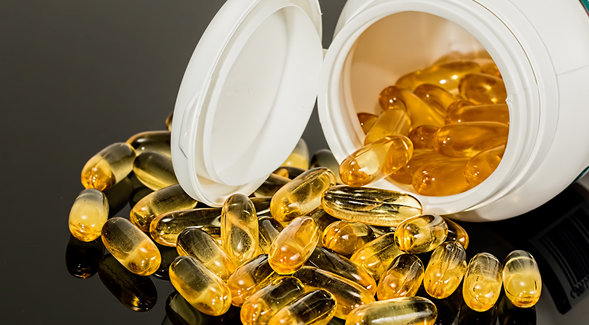Toxin-Contaminated Fish Oil Loses Health Benefits
A team of SDSU researchers found that fish oil tainted by organic pollutants loses its cancer-fighting properties.

Weighing the health risks and rewards of eating fish and taking fish oil supplements is a tricky task. Fish oil, rich in healthy polyunsaturated fatty acids, can protect against certain types of cancer, but many types of fish are also contaminated by waterborne toxins. A new study by San Diego State University researchers found that toxin-contaminated fish oil loses much of its cancer-preventative properties.“There are no real regulations for dietary supplements, so you as the consumer need to look at the labels and see what kind of fish is used and whether it’s been purified.”
In 2004, the U.S. Food and Drug Administration issued a recommendation that young children and women who are pregnant or could become pregnant should avoid eating large amounts of fish and shellfish. Nearly all fish and shellfish contain mercury, which is especially hazardous for developing children. In recent years, the agency has expanded the warning to note that fish also frequently contain dangerous chemicals called polychlorinated biphenyls, or PCBs.
PCBs belong to a class of chemicals—known at persistent organic pollutants (POPs)—that break down extremely slowly in the environment. The U.S. government signed onto a worldwide agreement in 2001 that banned known POPs from manufacturing, and as a result, their levels in the environment have dropped precipitously. But POPs can still be found throughout the food chain, most frequently in fish. As bigger fish eat smaller ones, the levels of POPs builds up in stronger concentrations.
“Large fish are now mostly the source of POP contamination for humans,” said the new study’s lead author, San Diego State University nutrition professor Mee Young Hong.
A number of health risks, including reproductive, developmental, behavioral, neurologic, endocrine, and immunologic effects, have been linked to eating fish with high concentrations of these toxins, but no one has looked at how POP concentration impacts the healthy effects of fish oil. To find out, Hong and co-author Eunha Hoh, an environmental health faculty member at SDSU, led a study looking at various POP-exposure levels in rats.
The study gave newborn rats either purified fish adulterated with POPs (including PCBs), purified fish oil, or corn oil as a control, then followed their health over the next 9 weeks. Hong, Hoh and their colleagues found that the rats given purified, toxin-free fish oil had the lowest number of pre-tumorous polyps. The rats given corn oil had the most polyps—indicating, as expected, there was no protective effect. But the rats given the POP-contaminated fish oil also showed a large number of polyps, suggesting the oil had lost much of its cancer-preventative properties. The researchers published their findings in The Journal of Nutrition, which selected the paper as the issue’s “editor’s choice.”
Even though further work will be needed before these findings can directly translate to humans, Hoh and Hong recommend that seafood eaters take a few lessons to heart. First, eat small fish whenever possible, as these fish are lower on the food chain and will have accumulated less POP build-up from eating smaller contaminated fish. Second, when buying fish oil supplements, look for bottles that say they come from small fish, and for a seal that states its manufacturer has removed contaminants.
“There are no real regulations for dietary supplements, so you as the consumer need to look at the labels and see what kind of fish is used and whether it’s been purified,” Hoh said.



